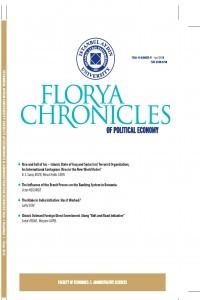EXAMINING THE ECONOMIC AND POLITICAL DIMENSIONS OF THE EASTERN MEDITERRANEAN PROBLEM FROM A MACROECONOMIC PERSPECTIVE WITHIN THE FRAMEWORK OF NEO-REALISM AND NEO-LIBERAL
EXAMINING THE ECONOMIC AND POLITICAL DIMENSIONS OF THE EASTERN MEDITERRANEAN PROBLEM FROM A MACROECONOMIC PERSPECTIVE WITHIN THE FRAMEWORK OF NEO-REALISM AND NEO-LIBERAL
The United Nations Convention on the Law of the Sea uses the concept of a country's designation as an Exclusive Economic Zone for coastal countries that extend beyond its territorial waters. Accordingly, a state within a 200-mile zone has the right to extract natural resources. On the other hand, since the Turkish Republic of Northern Cyprus is not recognized by other states, according to international law, the entire island is still subject to the Republic of Cyprus. In other words, the Greek Cypriot part of the island is accepted as the Republic of Cyprus and in this respect, this region is seen as the Exclusive Economic Zone of the Republic of Cyprus. However, Turkey argues that the islands are not an Exclusive Economic Zone and therefore sees gas exploration as legitimate. Instead, Turkey considers the coastline of the mainland mass in the Eastern Mediterranean to be very important. On this basis, the Turkish government claims a part of the marine area as the Exclusive Economic Zone, and therefore the natural gas deposits here are located on the Turkish continental shelf. Turkey also demands that the internationally unrecognized Turkish Republic of Northern Cyprus receive a share of the revenues from its gas reserves. This study aims to evaluate this complex problem from a macroeconomic perspective within the framework of neo-realism and neo-liberal perspectives.
___
- [1] Aybar, A. (2018), Doğu Akdeniz Enerji “Dalaşı” ve Mısır- İsrail Yakınlaşması, https://tasam.org/tr-TR/Icerik/50228/dogu_akdeniz_enerji_dalasi_ve_misir_-_israil_yakinlasmasi /Erişim tarihi: 20.09.2021
- [2] Alper, G, (2020), Uluslararası Hukuk Çerçevesinde Doğu Akdeniz’deki Münhasır Ekonomik Bölge İlanları ve Sınırlandırmaları: Türkiye’nin Güvenliği ve KKTC Üzerindeki Etkiler, Anadolu Strateji Dergisi, 2 (2), 29-42.
- [3] Algür, B, (2020), “Kıbrıs ve Doğu Akdeniz’deki Son Uluslararası Gelişmeler Işığında Değişen Türkiye, ABD ve NATO Politikaları”, Anadolu Strateji Dergisi, 2 (2), 55-70. [4] Alpago, H. (2018), İktisadi düşünce tarihi, güncel ve eleştirisel bir bakış açısıyla, Konia, Çizgi Yayınları,
- ISSN: 2149-5750
- Yayın Aralığı: Yılda 2 Sayı
- Başlangıç: 2015
- Yayıncı: İstanbul Aydın Üniversitesi
